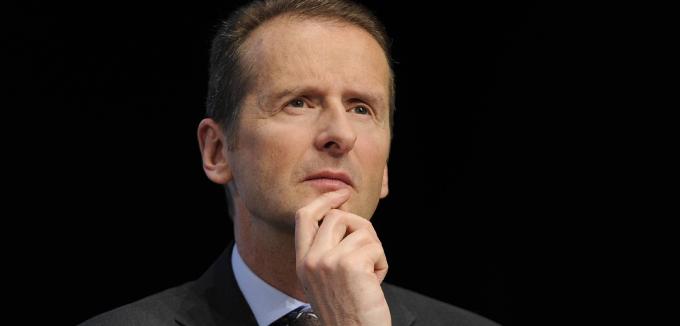
05/28/2018
Decency alone is not enough Where VW boss Herbert Diess is wrong
A statement by Jürgen Weibler
imago / Sven Simon
Herbert Diess: “VW must be decent!”
The concept of integrity has a steep career – so steeply that some reject the term or a management oriented to it again as “fashionable” and “unfit” and would like to put to the files, such as Markus Pohlmann recently at this point, My advice here is quite different: you should strive for personal integrity uncompromisingly and companies should establish integrity management in the best possible way. To do this does not mean to refrain from doing something else, for example compliance take care of. But this is not a fair weather event because integrity requires courage and is not for opportunists and profit maximizers.
In Integrity Management, his opponents like to build a straw man to clear the table. For a start, you assume that a company (or its top management) is generally of the highest integrity – and that’s why integrity is all about employees. But to supply them with a “moralization” through a deliberate “internalization of values and norms” must fail, as historical examples show. Thus, the approach is shown as unfit, ergo is the integrity management of the table. Who would want to contradict this?
Not the employees, the structures are the problem
The catch here is: This sophistic view reverses the problem by exactly 180 degrees. After all, the ethical distortions within companies essentially do not arise from the fact that (individual) employees are morally degenerate or baseless. Rather, they are all too often in structures and cultures on the move and are stuck in them, which can be described as yield-fixed – and sometimes with frighteningly short-term focus. In the debate, it is aptly referred to as “profits at all costs” or “whatever it takes” cultures, which are paired with structures driven by an ever-increasing “goal stretching” in conjunction with an unbounded “pay for.” performance “are marked.
It is these structures and cultures that entice employees (mind you: do not force them, so do not nullify free will) to push into moral gray areas and, in the worst case, ignore legal requirements. And: These structures and cultures do not fall from the sky. They are made or desired to be desirable. In affected companies, the initiator of such “movements” is usually the top management, simply because it is the most powerful group that benefits most. The fact that closed areas in companies move beyond their legal or legitimate limits, as opposed to the actual policy, may be an exception to the rule and is well researched as a phenomenon (“corps mind”). Therefore, if integrity management is required, one can only ask that directors and CEOs take the issue of integrity seriously – and create work situations that are clearly visible to their employees and that do not attack their moral steadiness in everyday work but support it.
Integrity for the wrong reasons is opportunism
We are already at it Volkswagen, the current example par excellence. Because here can be assumed with good reason, that it was above all the culturally and structurally transformed return pressure across the hierarchy levels, which is responsible for the apparent loss of integrity (customer fraud, greenwashing, breaking law). At first glance, one could also assume that VW has learned his lesson in the meantime and wants to be serious with more integrity. So just announced the new CEO Herbert Diess: “VW must be decent!” The reason for this he also called: “Because only so lasting economic success is possible.”
Immanuel Kant would say: The right things are done – but for the wrong reasons. Which means: If you only want to be more decent because you want to be more successful in the long term, you will not really be more decent, just calculate differently. For this reason, Diess’ admission has nothing to do with the pursuit of (real) integrity, but with Opportunism and possibly Ignorance a great deal.
True integrity is rooted in the opposite constellation. It comes into play in situations in which everything indicates that “indecent” behavior (even in the long term) is materially more promising than “decent” behavior. Integrity only becomes really crucial when ethics and success (strategically) conflict with each other. What do we do when a breach of law seems lucrative and will most likely go unnoticed – and in the unlikely event of its actual remark, it is not really sanctioned? Integrity is the entity that decides how to deal with such temptations.
The same applies to the power companies often have over their stakeholders. Are they using them to override uninformed shoppers in order to relieve jobseekers with lower wages and reduce tax liabilities to 0.01 per cent? Or does integrity withstand all these temptations and remain fair and virtuous in order to revive a word spilled in many a contemporary?
Page 1 of 2
Related articles
more on the subject
© manager magazin 2018All rights reservedReproduction only with the permission of manager magazin Verlagsgesellschaft mbH
